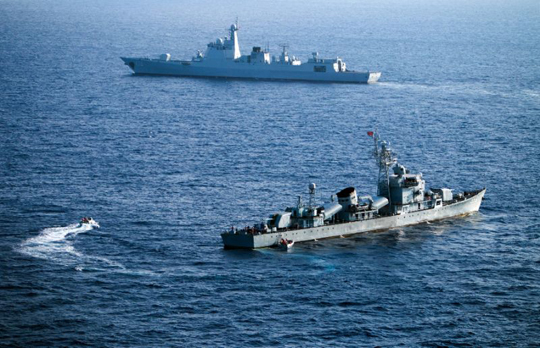Jan 13: The US risks a “large-scale war” with China if it attempts to blockade islands in the South China Sea, Chinese state media has said, adding that if recent statements become policy when Donald Trump takes over as president “the two sides had better prepare for a military clash”.

China has controversially built fortifications and artificial islands across the South China Sea. Rex Tillerson, Trump's nominee for secretary of state, said China's “access to those islands … is not going to be allowed”.
China claims nearly the entire area, with rival claims by five south-east Asian neighbours and Taiwan.
Tillerson did not specify how the US would block access but experts agreed it could only be done by a significant show of military force. Tillerson likened China's island building to “Russia's taking of Crimea”.
“Tillerson had better bone up on nuclear power strategies if he wants to force a big nuclear power to withdraw from its own territories,” said an editorial in the Global Times, a Communist-party controlled newspaper.
“China has enough determination and strength to make sure that his rabble rousing will not succeed … Unless Washington plans to wage a large-scale war in the South China Sea, any other approaches to prevent Chinese access to the islands will be foolish.”
Under Barack Obama the US remained neutral on sovereignty claims, not recognising any ownership, but often challenged China's control of the area by sailing warships past islands in what it called freedom of navigation exercises.
If that policy became more confrontational, including denying China access to islands it already controls, “it would set a course for devastating confrontation between China and the US”, declared the state-run China Daily.
China's official response was more tame. Foreign ministry spokesman Lu Kang said China-US relations were based on “non-confrontation, non-conflict, mutual benefit and win-win cooperation”.
Both newspapers also dismissed recent statements by Trump and his team – taking a similar stance to the Chinese government, which is waiting for Trump to be sworn in before equating his words with policy.
Tillerson's remarks “are not worth taking seriously because they are a mish-mash of naivety, shortsightedness, worn-out prejudices and unrealistic political fantasies”, the China Daily wrote. “Should he act on them in the real world it would be disastrous.”
There are signs, though, that Trump shares Tillerson's views and they will be carried into the White House.
In December, Trump made similar comments in an interview with Fox News, accusing Beijing of “building a massive fortress in the middle of the South China Sea, which they shouldn't be doing”.
Peter Navarro, Trump's pick to head the newly created national trade council, has been extremely hostile to China and encouraged the president-elect to pursue a “peace through strength” policy in the region.
“Beijing has created some 3,000 acres of artificial islands in the South China Sea with very limited American response,” Navarro has previously written.





Comments
Add new comment